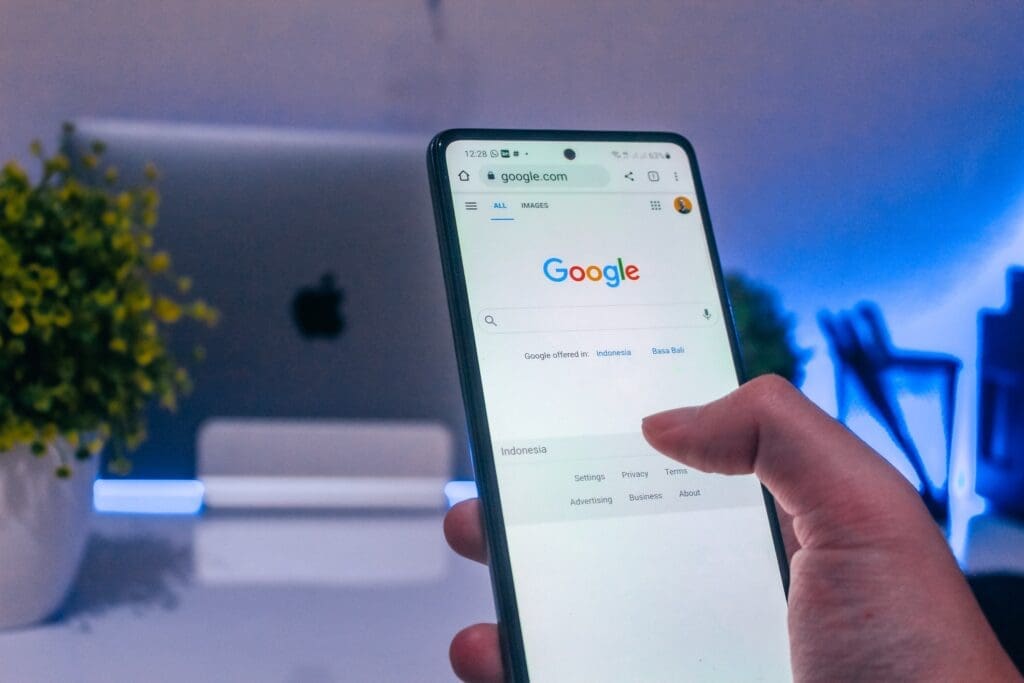What exactly is mobile app testing?
Put simply, mobile app testing is a process of checking the functionality and usability of your app on a multitude of mobile devices, ensuring it remains both usable and enjoyable regardless of device.
As a vertical within app development, mobile app testing is a huge market that’s with a projected CAGR of 15.37% over the next five years.

Now, let’s go beyond simple and break this broad concept down into smaller parts.
Here’s what we’ll cover in this post:
- benefits of mobile app testing
- guide on how to test a mobile app
- different tools for testing mobile apps
- FAQs on mobile app testing
Let’s start!
Benefits of mobile app testing
Let us begin with ‘why’ you should care so much about mobile app testing.
The journey of building a mobile app is never without obstacles, and the more complicated an app, the more moving parts it usually has, further emphasizing the value of testing.
Enhanced user experience
By conducting mobile app user testing, you gain invaluable insights into your users’ preferences, pain points, and behavior. This data is a goldmine that allows you to improve your app’s user experience significantly.
Better mobile app quality
Your app’s overall performance and functionality are validated through testing. When problems are identified and fixed before release, your app is bound to perform as expected, reducing user complaints and negative reviews.
Security assurance
Few things scare away potential users more than poor data security. Security testing for mobile apps can identify potential vulnerabilities in a safe environment and quickly rectify them. This ensures your medium for business transactions is secure and maintains the trust of users.
Cost reduction
Identifying and fixing bugs in the early stages of development is much less expensive than resolving them after your app has been launched. Mobile app testing helps you save on resources and the potential cost of a defective app, not to mention the greater opportunity cost of lost business later on.
Increased ROI
A well-performing, user-centric app is likely to get more downloads, boost customer retention, and improve business results. Testing your mobile app diligently can increase your return on investment.
How to test a mobile app
With a carefully planned approach and understanding of the different types of tests that developers must perform, you can ensure your app’s functionality, compatibility, usability, and security.

It’s not just about finding bugs. Through app testing, you can verify if your features are working as expected and delivering a lovable user experience.
Unit Testing
Unit Testing is a type of testing where individual components of a mobile app are tested. In the case of software development, a unit could be an algorithm, a module, or a class. The primary aim of unit testing is to validate that each unit of the software performs as intended.
Here’s what developers do during a unit test:
Test each function of the mobile app
Ensure that each feature of your mobile app performs as expected independently. This can typically involve testing various input combinations and checking the outputs.
Identify bugs early
An effective unit test can help in catching bugs early in the development cycle, which in turn reduces the cost and time to fix them.
Use a mobile app testing tool
Automating unit testing can save a significant amount of time. Leveraging a mobile app testing tool can simplify the process and enhance accuracy.
Integration Testing
Following unit testing, Integration Testing is the next level. It is a type of testing where individually tested components are combined and tested as a group. The main purpose is to identify any faulty interaction between these different components.
The steps to undertake during integration testing are:
Combine and test
Combine the various components of your app and then test them to ensure they work together without issues.
Improve app stability
This can help in recognizing and resolving any integration issues, leading to improved app stability and user experience.
Mobile app testing automation
Integration test often requires multiple executions; automating the test can be effective in such scenarios.
Unit Testing and Integration Testing are two indispensable parts of mobile app testing and are usually done by developers at the code level by writing automated scripts to test new changes before they are implemented.
Functional Testing
Functional testing is used to check whether your app works as intended. All the app functionalities are tested under this process including buttons, forms, login functionalities, and more.
- Open the app: Start by opening the app to ensure it launches without crashing.
- Test all features: Try out all the different features of your app to ensure they all function as intended.
- Check the user interface: The screens, buttons, and pages should all be working as expected.
Usability Testing for Mobile Apps
Next on the list of tests crucial for efficient mobile app testing is usability testing. Understanding usability testing and how to utilize it can significantly enhance your mobile app’s user experience, ensuring the delivery of a high-quality product your audience will love.
- Navigation: Test for ease of navigation through your app. Can users easily find what they need?
- Uniformity: Check if design elements are consistent throughout.
- Clear Instructions: Make sure all functions and features are self-explanatory.
- Error Rate: Gauge how often users make mistakes while using your app, and how easy it is for them to recover from these mistakes.
- Satisfaction: Evaluate how satisfied users are with the overall experience of your app.
User Interface Testing
User interface testing puts the overall look and feel of the app under a microscope. It investigates the app’s layout, designs, colors, fonts, and other visual aspects to ensure it provides a positive user experience.
Mobile Compatibility Testing
Compatibility testing ensures the app performs well on different devices, Operating Systems, screen resolutions, and more. This type of testing is crucial as mobile devices, platforms, and mobile networks can greatly differ.
Security Testing for Mobile Apps
A crucial aspect of mobile app testing is to ensure the data privacy and integrity of users. Security testing helps identify any vulnerabilities in the system that could allow unauthorized access to sensitive information.
Mobile Performance Testing
This test checks how your app performs under load, during peak load times, and how much resources it’s consuming. It ensures the smooth functioning of the app under varying loads and extreme conditions.
Finally, always consider mobile app testing automation.
Use cases of automation in mobile app testing
Mobile app testing automation is a game changer when it comes to validating your app’s functionality, performance, and usability.

Let’s delve into the areas of mobile app testing where automation can bring significant value:
Test Case Execution
In test case execution, an automated tool aids in running a set of predefined test cases and recording the results. This eliminates the need for repetitive manual checking.
User Interface (UI) Testing
- App Navigation: You can automate tests to simulate how a user will navigate your app’s interface.
- Screen Orientation Changes: Test if your app can correctly handle orientation changes on devices.
- User Input Simulation: Automate the simulation of user interaction with your app – typing into fields, button clicks, swipes, etc.
Performance Testing
Automated performance tests track an app’s speed, reliability, and resource usage under varying levels of load. This gives you an understanding of how the app performs under heavy stress, mimicking real-world user behavior.
Security Testing for Mobile Apps
- Vulnerability Scanning: Automated tools can scan your app for known security vulnerabilities.
- Penetration Testing: Simulate attacks on your app to ascertain its robustness against real threats.
- Privacy Checks: Automated checks to verify your app complies with data protection and privacy laws.
In conclusion, automation in mobile app testing goes a long way in improving the efficiency, reliability, speed, and comprehensiveness of your tests.
The right mobile app testing tool will not only automate the mundane parts of testing but also ensure more accurate findings and faster turnovers.
Different tools for mobile app testing
Mobile app testing tools have been designed to assist developers throughout the testing process, automating tasks where possible, and offering insights into app performance and user experience.
Fun fact: Mobile app testing solutions make up 45% of the total app testing solutions market!
Here are some of our recommended tools and the purpose they serve.
| Appium | This is an open-source tool that automates native, mobile web, and hybrid applications for iOS mobile, Android mobile, and Windows desktop platforms. |
| Calabash | This open-source tool offers an easily understandable domain-specific language for testing mobile apps. By using it, you can ensure the seamless operation of your app. |
| XCUITest | XCUITest is a UI testing framework that allows you to write UI tests for iOS apps directly within Xcode. By using XCUITest you can perform high-precision testing on your app interface. |
| EarlGrey | EarlGrey is a native iOS UI automation test framework that enables you to write clear, concise tests, improving the efficiency and performance of your testing process. |
| Espresso | An open-source tool from Google mainly used for Android UI testing. It provides APIs for writing UI tests to simulate user interactions within a single app. |
| Detox | For developers using React Native, Detox is a popular end-to-end testing and automation framework that runs on a device or emulator, just like an actual end user. It is functionally rich and provides robust testing capabilities. |
The most important mobile app testing tool: real-life users!
When discussing mobile app testing, it’s important to emphasize one of the most valuable resources we have: real-life users. Your users – the ordinary people who download, interact with, and provide feedback about your app – are the ones who will ultimately determine the success of your app.

They are the truest form of mobile app user testing.
But why, you ask, place such value on user testing?
- User testing provides real-time feedback: This authentic interaction allows you to identify how users are experiencing your app, where they’re getting stuck, and what they’re enjoying or disliking.
- User testing helps identify patterns: By having a large array of demographics, you can identify trends and patterns that could indicate strengths or weaknesses in your app.
- User testing aids in prioritizing features: Based on feedback and usage, you can determine which features are essential and which are less so, allowing you to prioritize your development resources effectively.
Conclusion
Mobile app testing plays a crucial role in guaranteeing that your app functions as expected without glitches and offers a delightful user experience.
Be it mobile app user testing, carrying out security testing for mobile apps, or automating via mobile app testing automation, each type of testing adds specific value to the app development lifecycle, so it’s crucial to allow mobile app developers the time to fully and systematically test your mobile app.
After all, have you ever heard of an app that turned out terrible because of too much testing?
🔑 Key Takeaways
- App testing is crucial to ensure your app works flawlessly and offers a delightful user experience.
- Involving users in the testing process helps capture invaluable feedback from the user’s point of view.
- It’s vital to conduct security testing for your mobile app to protect user data and maintain trust.
- Using the right mobile app testing tools allows for all the necessary forms of testing to be carried out properly.
- Automating testing tasks can simplify the testing process and increase efficiency.
- As a non-technical founder, you don’t have to do most of these tests, but make sure you test the functions of the app once your developer has implemented a change.
FAQs About Mobile App Testing:
- What is mobile app testing?
💡A process through which applications developed for handheld devices are tested for functionality, usability, and consistency. - What is the importance of mobile app testing?
💡It ensures the app functions as expected, free from bugs or glitches, and delivers a seamless and satisfying user experience. - What is the role of automation in mobile app testing?
💡Mobile app testing automation expedites the testing process, reduces human intervention, and increases the speed of testing. - How does security testing for mobile apps work?
💡Security testing for mobile apps ensures the security of data, protecting it from possible threats. - How do I choose the right mobile app testing tool?
💡It’s more of a choice for developers to make, but the right mobile app testing tool should accommodate the requirements of your app, including support for the platforms you target, compatibility with your existing development tools, and fit within your budget.





